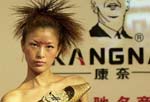Economy
China hikes rates against inflation
Updated: 2011-04-07 09:39
(Xinhua)
BEIJING - The Chinese central bank's move to raise the benchmark interest rate drew diverging views from economists, and set the country's equity markets above a key psychological barrier on Wednesday.
The increases of banks' one-year borrowing and lending rates by 25 basis points take effect beginning Wednesday. The benchmark Shanghai Composite Index increased more than 1.1 percent to close at 3,001.36 points during the day.
"The rate hike by the People's Bank of China (PBOC) came a little bit earlier than we had anticipated, " said Lu Zhengwei, chief economist of the Industrial Bank Co Ltd
A report by the Industrial Bank warned that the continuing monetary squeeze-out is gradually showing negative accumulative effects on the economy. The report also said that the economic slowdown is one of the "major risks" that need to pay a close attention.
To counter persistent inflationary pressure, the PBOC, has adopted a series of tightening measures this year, including hiking interest rates twice, raising banks' reserve requirement ratio three times and appreciating currency.
Also on Wednesday, the Chinese currency Renminbi (RMB), or the yuan, hiked 31 basis points from last Friday to a record high of 6.5496 a US dollar.
Li predicted the March Consumer Price Index (CPI) could hit a record high of 5.3 percent amid soaring oil and grain prices in global markets, adding to China's pressure to continue its macro control policies.
The CPI, a major gauge of inflation, jumped 4.9 percent in February from the previous year, exceeding the government's full-year target of 4 percent.
The National Bureau of Statistics will release China's CPI figure for March and other quarterly economic data next week.
According to economists' projections, China's March CPI will climb above 5 percent, or even as high as 5.6 percent.
Hua Zhongwei, a macroeconomic analyst for Huachuang Securities, said the central bank's rate hike fit his expectations as the increase will help improve the country's "negative interest rate" in real terms and stabilize inflation expectations.
After the rate hike, the interest rate of one-year deposits in Chinese banks was 3.25 percent, compared to the inflation rate of 4.9 percent in February.
"As the Purchasing Managers Index reading in March suggests, continuous tightening measures did have an impact on the development environment for medium- and small-sized enterprises," Hua said.
The growth of order backlogs and inventory levels are accelerating over 4 percentage points faster than February, pointing to slower growth of manufacturing activities, according to the China Federation of Logistics and Purchasing (CFLP).
China's leading index, a measure of the economy's outlook, fell to 101 in February, the 11th consecutive month of declines.
Other economic indicators, such as industrial value-added output, retail sales, planned investment and exports, all signalled slower growth in February
The Chinese economy may slow down slightly month-on-month in the near future, but a significant comedown is less likely, Lu said.
"We predict China's economic growth to remain relatively strong at around 9.5 percent in the first quarter. And inflation control will continue to be authorities' top priority," he said.
Zuo Xiaolei, chief economist of Galaxy Securities, said it is difficult to forecast when authorities will end the macro control policy.
"There are a lot of uncertainties in the future," Zuo said, citing factors such as excessive global liquidity and strong expectations of inflation of agricultural produce in world markets.
"What we need to do is to closely observe the monthly data of aggregate effects of macro control policies that have been launched," she said." A stable and healthy monetary policy will be the main theme for this year and it won't change because of a single month's data."
Specials

Share your China stories!
Foreign readers are invited to share your China stories.

Fill dad's shoes
Daughter and son are beginning to take over the family business of making shoes.

Have you any wool?
The new stars of Chinese animation are edging out old childhood icons like Mickey Mouse and Hello Kitty.



